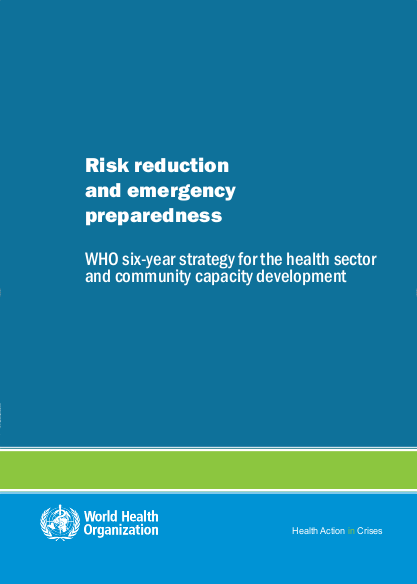WHO six-year strategy for the health sector and community capacity development

Major emergencies, disasters and other crises are no respecters of national borders and never occur at convenient times. The magnitude of human suffering caused by these events is huge, and many aspects of people’s lives are affected – health, security, housing, access to food, water and other life commodities, to name just a few. That is why it is vital to have emergency plans in place, so that the effects of disasters on people and their assets can be mitigated, and acoordinated response may be launched as effectively and efficiently as possible when disasters or other crises strike. The aim is to save lives and reduce suffering. Although many emergencies are often unpredictable, much can be done to prevent and mitigate their effects as well as to strengthen the response capacity of communities at risk.
The World Health Organization is the lead agency for addressing the health aspects of emergency preparedness and response. In 2005, its World Health Assembly (WHA) passed a resolution calling on the Organization to provide technical guidance and support to countries building their emergency response capacities, stressing a multisectoral and comprehensive approach. The following year, another resolution called on Member States to further strengthen and integrate their response programmes, especially at the community level, and emphasized interagency cooperation at the international level. WHO Regional Committees have also passed resolutions in support of emergency preparedness.
In 2005, the Humanitarian Response Review, commissioned by the Emergency Relief Coordinator, concluded that major improvements were needed in humanitarian response. The Inter-Agency Standing Committee (IASC), the United Nations Economic and Social Council and the UN General Assembly therefore recommended the implementation of a set of four humanitarian reforms in order to improve the capacity, predictability, timeliness, effectiveness and accountability of international humanitarian action including: the strengthening of the Humanitarian Coordinators System, the establishment of a Central Emergency Response Fund and other financial reforms, enhanced partnership between UN and non-UN humanitarian agencies, and the cluster approach. WHO is the designated lead of the health cluster, the role of which is to build global capacity for humanitarian health action by developing global guidance, standards, tools and resources to inform, enhance and facilitate the implementation of the Cluster Approach at the country level as well as to improve surge capacity, access to trained technical expertise and material stockpiles to improve response operations. A key to achieving the desired impact of these reforms, and specifically of the cluster approach, is the strengthening of the preparedness capacity of countries and communities particularly at risk before emergency strikes.
The World Conference on Disaster Reduction, held in January 2005 in Kobe, Japan, adopted the Framework for Action 2005–2015: Building Resilience of Nations and Communities to Disasters and provided and promoted a strategic and systematic approach to reducing vulnerabilities and risks to hazards. WHO will partner the United Nations International Strategy for Disaster Reduction (ISDR) and other UN and non-UN agencies in the 2008–2009 Safe Hospitals Initiative, which aims at building the resilience of hospitals and other health facilities to disasters, both structural and functional, so that they would still be functional under emergency situations.
Under the aegis of international policies, including WHA resolutions, and as part of its mandate as the international health lead agency and the IASC global health cluster leader, WHO intensified its work during 2006 in the field of emergency preparedness and response. Beginning with the definition of its global strategy and moving gradually into the implementation of the main directions highlighted in the strategy.
Resource collections
- UN Habitat - Urban Response Collection
- Urban Response - Urban Crisis Preparedness and Risk Reduction
- Urban Response Collection - Community Engagement and Social Cohesion
- Urban Response Collection - Economic Recovery
- Urban Response Collection - Environment and Climate Change
- Urban Response Collection - Housing, Land and Property
- Urban Response Collection - Urban Crisis Response, Recovery and Reconstruction
- Urban Response Collection - Urban Resilience